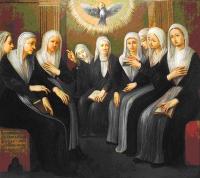
Saint Angela Merici (1474-1540)
Feast day: 27 January
St Angela, foundress of the Order of St Ursula, was born in 1474 in Desenzano del Garda, a small town on the shore of Lake Garda. She and her sister were orphaned when she was fifteen years old and they went to live with an uncle in the town of Salo. Her sister died suddenly and Angela became very distressed because she had not received the Last Rites; however, she had a vision of her sister in the company of the saints, which reassured her. Angela seems to have been a very determined young woman. She joined the Third Order of St Francis and, to discourage admirers who were attracted by her beauty and particularly her hair, she covered it in soot! She wanted to belong only to Christ.
Her uncle died when she was twenty and she returned to Desenzano. She soon became very conscious that girls received little education. Women were not allowed to teach and the best educated women - apart from aristocrats - were nuns but they were cloistered. Angela, who was self-taught, began to teach young girls in her home and to draw around her like-minded women, especially fellow Franciscan tertiaries, to assist her. The venture was a success and she was invited to found another school in Brescia. She had a vision that she was to found an order devoted to the education of girls. As mentioned previously, Angela was resolute in what she felt called to do and would later have the courage to refuse the Pope’s request to take charge of a nursing order of sisters.
In 1524, at the age of fifty, Angela visited the Holy Land. On the island of Crete she was struck blind, but still journeyed on to the Holy Land. She received her sight back while praying before a crucifix in the same place in Crete on the way home. It is interesting that St Ignatius was in the Holy Land at a similar time and their lives sometimes follow a similar pattern. The Rule of Angela’s company, which was founded in 1535, was approved by Pope Paul III four years after that of the Jesuits. What Ignatius did for boys, though it was not his immediate intention, Angela did for girls. Like Ignatius, Angela believed that though her companions were to dedicate themselves to lives of poverty, chastity and obedience, they were to live in the world rather than withdraw from it; in fact the members of her group took no special vows during her lifetime, wore no distinctive habit and taught from their own homes. This was very innovative. She dedicated the company to St Ursula, patron of students. The order became known as Ursulines.
By the time of her death in 1540, there were twenty four communities of the Company of St Ursula in the region. They began another new practice of giving religious instruction in the local parish church. Previously this had been only done by the parish priest. The official church became increasingly uncomfortable with the idea of a group of consecrated women living independently of direction from clergy. In 1572, the stern reformer, Charles Borromeo, insisted they become an enclosed order. However, Ursuline nuns were able to leave the cloister when the good of the girls they taught demanded it. Vatican II restored the freedom that Angela had envisioned.
Angela Merici deserves better recognition for her innovations in Catholic female education and for the contribution she has made to thousands of women who have been taught and inspired by her nuns.
St Angela Merici, foundress of the Order of St Ursula, pray for us.